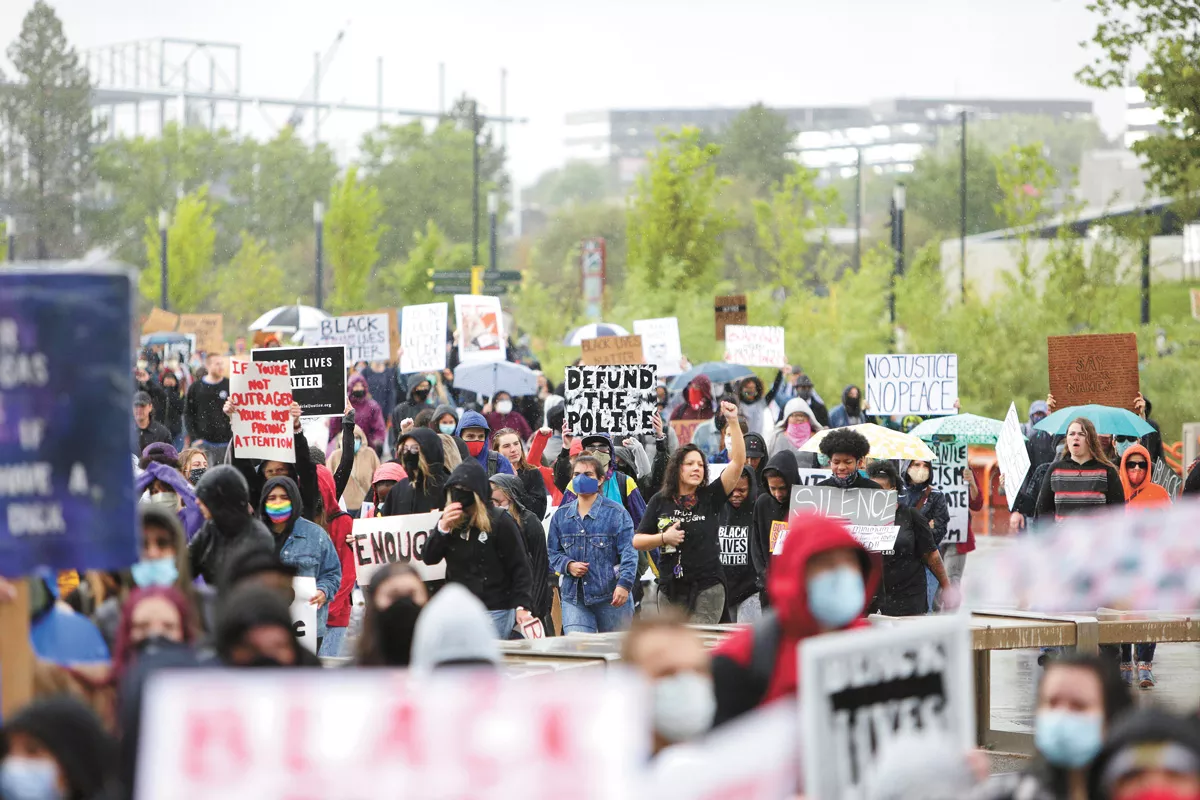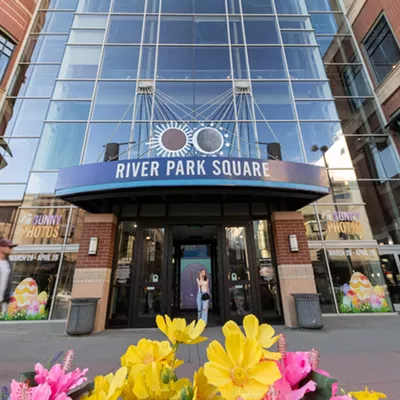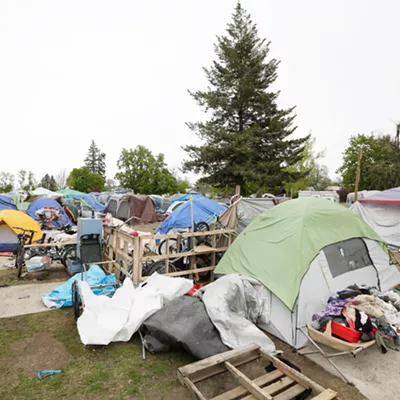
This was supposed to be the year that Republicans finally got their comeuppance. Sure, their partnership with Donald Trump might have won conservatives a tax cut and one or two — OK, three — Supreme Court justices. But as the 2020 election approached, the polls predicted that a blue wave was a-comin' and when it hit, Trump was going to sink the Republicans like concrete shoes.
Dave Wilson was counting on it.
Wilson, a centrist Democrat who came within a few hundred votes of winning a state representative race in 2018, hoped the wave would be so big it would float him over Eastern Washington's longtime congresswoman, Cathy McMorris Rodgers.
That's not what happened. Joe Biden caught a wave. But a lot of Democrats ended up drowning.
While Biden racked up a national lead of more than 5 million votes against Trump, millions of those voters refused to support Democrats down the ticket. The party had hoped to gain as many as 15 seats in the U.S. House. Instead, as ballots are still being tallied, they have lost a net of seven.
"I'm keenly aware," Wilson says, letting out a weary chuckle. He got shellacked this year by 22 points.
Yet more than 23,000 voters in McMorris Rodgers' Eastern Washington district voted for Biden, but not Wilson.
Before he called back the Inlander, he took a folded sheet of printer paper and scribbled down on his thoughts on why many Democratic candidates suffered this year:
"DEFUND THE POLICE" and "SOCIALISM."
"In that order," he says.
And he wasn't the only one who felt that way.
A few days earlier, on a private conference call among House Democrats, there were more tears than cheers. They hadn't taken back the Senate, meaning Biden's ambitious agenda could be dead on arrival. (Two runoff races in Georgia in January could potentially tie the Senate in favor of the Democrats.)
"It was a failure," Rep. Abigail Spanberger, a moderate Democrat who barely survived in Virginia, said of congressional election results, according to the recording published by the Washington Post. "We lost members that shouldn't have lost."
The truce between the two wings of the Democratic Party is over, and some moderate members are ready to cast blame squarely on the vocal activist left: claiming the explosion of high-profile activism from places like Portland and Seattle had backfired.
"We need to not ever use the words 'socialist' or 'socialism' ever again," Spanberger said on the House Democrats' post-election conference call. "We have lost good members because of that."

Tear gas hissed through the Seattle apartment windows of Kamau Chege this summer — a reaction to the racial justice demonstrations that the cops called "riots," but Chege calls "uprisings."
Through those same windows on the morning of Nov. 7, it was music that floated inside — Black Eyed Peas, Kendrick Lamar, Lizzo — mingling with a chorus of cheers and honking cars. From 9 am until midnight — 15 straight hours — a block party outside raged in honor of Biden's victory.
It wasn't just in Seattle: All across the country, the sort of street celebrations normally reserved for winning a Super Bowl or blowing up a Death Star were seen.
Even Chege's mom, a conservative Kenyan evangelical who didn't care much for politics, was overjoyed.
"We got it," she texted her son. "Praise God.
After all, for Chege, Trump's election could have literally cost him America.
He's an undocumented immigrant from Kenya. And considering Trump's attacks on the Deferred Action for Childhood Arrivals program and habit of targeting activists like him, he was "aware of just how disastrous a second Trump term would have been."
Chege celebrates Trump's defeat as an "outright rejection of white grievance," a blow to Trump's "concerted effort to ethnically cleanse our democracy" through deportations and litigation. In short: "a huge relief," Chege says.
A leftist activist who'd moved from Spokane to Seattle in 2018, he saw the energy of a thriving left-wing movement in cities like Seattle as crucial in rallying infrequent voters to show up and vote to overthrow Trump.
And yes, the surge of protests in the wake of the death of George Floyd had invigorated the Democratic Party — sending Democratic voter registration in swing states like Georgia soaring.
But it also handed Republicans an arsenal of new weapons. Activists chanted provocative slogans like "defund the police" and "all cops are bastards." Protests in Portland and Wisconsin sometimes descended into rioting.
"This is not a Black Lives Matter issue," Wilson says. "This is 'looters and rioters that needed to be dealt with.' They weren't dealt with. That did not help us. It allowed irresponsible right-wing media to blame it on Black Lives Matter."
In Seattle, a few blocks away from Chege's apartment, police abandoned a precinct and, for three weeks, activists turned the surrounding area into a cop-free "Capitol Hill Organized Protest" zone. Chege had given speeches there.
But CHOP wasn't exactly paradise. Armed vigilantes provided security. People died. Trump demanded that Seattle "take back your city NOW" from "ugly anarchists," while Gov. Jay Inslee downplayed the situation.
Fox News added fuel to the fire, deceptively illustrating a story about CHOP in Seattle with a picture of a building ablaze at a Minnesota protest. Seattle shut down CHOP, but the clashes between the cops and protesters across the country continued. While polls initially seemed to indicate this unrest wasn't hurting Democrats, those same polls also wrongly predicted Democrats would destroy Republicans.
When Wilson told voters he was a Democrat, they threw "Defund the Police," CHOP and the violence in Portland back in his face.
"You get lumped in," Wilson says. "You're guilty by association."
Wilson celebrates that "Democrats came to their senses and nominated Joe Biden."
After all, Biden repeatedly and publicly distanced himself from parts of the left. He condemned protest violence. He repeatedly stressed he didn't support "defunding the police." He scoffed at the idea that he was a socialist, noting that he beat the socialist in the Democratic primary. He convinced Republicans and independents who'd voted for Trump that he wasn't some wild-eyed extremist.
But Biden wasn't the only Democrat Republicans were singling out.
In an interview with the Inlander, U.S. Rep. Russ Fulcher (R-Idaho) repeatedly steered the conversation toward the squad of left-wing Democratic House members that includes self-proclaimed democratic socialist Alexandria Ocasio-Cortez (D-New York).
"From what I can see, they don't have a tremendous amount of pull with other members," Fulcher says. "However, as soon as they step off the floor, there's a long line of national media that want to put them on the camera."
With the sort of savvy for dominating social media conversation that rivaled Trump, Ocasio-Cortez not only publicly sympathized with "defund the police" rhetoric, she also chided Democrats for undercutting the activist leaders.
Most Democratic politicians don't support socialism or defunding the police. But all the voters Wilson was trying to reach had to do was to look east to New York to see a socialist Democrat talking about revolution or west to Seattle to see a left-wing City Council — including another socialist — voting to cut police funding.
Wilson says he struggled to convince local voters he wasn't like that.
"Quite frankly, you had a very short window to have a conversation before those people just went off: 'Are you crazy? You're a Democrat. Are you people nuts?!'" Wilson says. "We need to be a party of more incremental change, not radical change. Americans don't like radical change."
Tina Podlodowski, chair of the Washington State Democratic Party, notes that Democrats actually did comparatively well in Washington state, making significant improvements in areas like southeast Washington.
She deflects a question about whether Democrats should have taken a stronger stand against CHOP — though she acknowledges "it stimulated the Republican base."
Podlodowski continues to see turnout — not persuasion — as secret to winning elections. The trouble is, this year, Republican turnout soared, too (though a lot of those Republican and independent voters were apparently persuaded to vote for Biden).
"There's a lot of noise and nonsense around 'socialism,'" Podlodowski says. "That's being used to scare people in the way that McCarthy used the word 'Communism' to scare people in the '50s."
She prefers to talk about the Democrats' winning policy platform around things like health care access, the minimum wage, education.
Still, as Podlodowski begins to explain how there are nuanced differences between the Democratic Socialism touted by Bernie Sanders and the Socialist Alternative brand of Seattle City Councilwoman Kshama Sawant, it's clear why the "socialism" attack is still effective in some communities.
As the Miami Herald reported, in places like South Florida, with massive Cuban and Venezuelan populations, the phrase "socialism" reminds some Latinos of the tyranny and brutality of regimes they or their relatives fled.
It's one reason why, despite Trump's infamous racist rhetoric, the president actually did better among groups of Latino voters, particularly in Texas and Florida, than Republicans have done in a long time. He did a bit better this time with Black voters, too.
"This was a year where I saw a few of my Black friends who were supporting Trump," Chege says.
But Chege doesn't think that was necessarily because of Trump's attacks on the left. Instead, he looks at how Trump had done the sort of thing that Republicans would have called socialism in another context: Congress passed a stimulus that sent $1,200 stimulus checks to voters. But Trump, showcasing the branding instincts that had made him a fortune, insisted that his signature be at the bottom.
Imagine you're a conservative evangelical Black guy who never felt the GOP cared about you, but then you lost your job because of COVID, and the president sends you a check, Chege says. Not only that, but you're making more money on unemployment than you had working.
Heck, many of the same Floridians who voted to re-elect Trump also voted to support a $15 minimum wage in the state.
Both Chege and Ocasio-Cortez blame mismanagement from the Democratic Central Campaign Committee and other establishment politicians for the Democrats' trouble this year, pointing to some swing-district races where progressive Democrats did better than the centrists. Too much triangulation, Chege argues, and your authenticity gets smothered in a pile of politician-speak mush.
"People are really looking for someone to fight for them, especially in a pandemic," he says. "That kind of clarity of purpose."
The coronavirus hurt Democrats in another way, Podlodowski says.
"The pandemic took away one of our great superpowers," she says.
They had an army of 14,000 volunteers who, in another year, would have been sent out to knock on millions of doors, having those crucial face-to-face conversations. Instead, they relied on less effective phone calls. That was the story across the country. Republican volunteers gleefully knocked on doors, while Democrats like Dave Wilson, committed to being the party that took the virus seriously, mostly stayed home.
"It's the right thing to do," Podlodowski says. "It was absolutely, positively the right thing to do."
Pursuing leftist policies can have an initial political cost, too, Chege acknowledges.
"It might mean that you're winning by smaller margins but doing more good," Chege says.
You can look at Obamacare — a huge policy victory for Democrats in 2010, one that Trump couldn't reverse. Eight years later, and even Idaho of all places, voted to take advantage of Obamacare's Medicaid expansion.
And because of that victory, Chege says, support for things like universal health care seem a lot more acceptable.
Yet there was a huge cost. In 2010, the opposition to Obamacare was so strong that the Tea Party wave took back the House and boosted Republican performances in state legislatures across the country. That put Republican legislators in control during the once-every-decade process of redrawing congressional district boundaries — and Republicans redrew them in a way to make it a lot harder for Democrats to win seats in the future. And now, a decade later, Democrats have lost the chance to undo many of those changes.
"Nobody's ever gonna forget that the Republicans stood with Trump for four years. They have a reckoning at this point."
But then again, after losing the presidency, Republicans don't necessarily feel like they won either.
"Nobody really advanced the ball that much for their cause," Fulcher says.
But the game continues.
"There's no finish line," he says. "This isn't like a football game, where you cross the endzone and you score and it's game over. No. It is ongoing."
And so for Podlodowski, there remains the hope that Republicans will, eventually, suffer for their support of Trump.
"Nobody's ever gonna forget that the Republicans stood with Trump for four years," Podlodowski says. "They have a reckoning at this point."
Podlodowski starts naming names like Republican Senators Mitch McConnell and Lindsey Graham and Washington state House Minority Leader J.T. Wilcox and state Senate Majority Mark Schoessler.
"They stood with these Trumpians and Trump," Podlodowski says. "And that's something on the Democratic side we're never going to let anybody forget."
But all those names have something in common: This year, all those Trump supporters won easily. Once again, the reckoning that has been prophesied hasn't arrived.
Still, "just wait and see," she says. There's still a chance that Democrats might take control of the Senate, if they manage to take both runoff races in Georgia. (Republicans are already trying to link one Georgia Democratic candidate to Fidel Castro.)
And after that, there's the fight for 2022.
Some Democrats are more optimistic for that fight than others.
"If we are classifying Tuesday as a success from a congressional standpoint," Virginia Democrat Spanberger said on the House conference phone call, "we will get f—-ing torn apart in 2022." ♦















